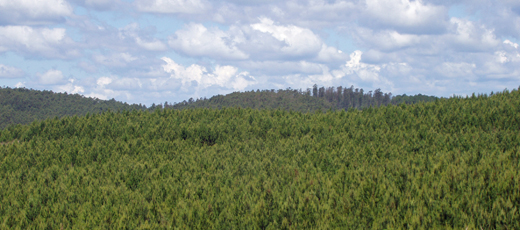Standing up to plantations
23/09/09 by D. Ryan
Two days ago news of the “International Day Against Tree Monocultures” arrived in my email via the World Rainforest Movement (WRM). There seems to be a Day for everything and I couldn’t help but chuckle inwardly at the thought of marching to some local forestry and hurling abuse at some conifer or other.

I then puzzled over whether I should be chaining myself to the offending trees or taking a chain saw to them? Tricky. Of course the true culprits of monocultures are the countries – and the companies - that allow this criminality against nature and native people to perpetuate and they are the real targets of this campaign.
A quick peek on a well known search engine revealed a few more days of note being celebrated on the same day. “International Day of Peace” for one. Just two days earlier was the fascinating “International Talk Like a Pirate Day”; yesterday was “International Car-Free Day”, and today is “Celebrate Bisexuality Day.” If you like.
Of course, we instinctively know why we plant monocultures; they provide easy and cheap access to a long-term supply of timber, paper pulp, and many other resources. What price these products without plantations? For example, it might be worth asking if they’re a necessary evil to keep prospectors out of native forests. This would of course be countered by WRM, and plenty of other like-minded individuals and organisations, who say plantations are a “major cause of deforestation” and I’m inclined to agree with them - having seen barren stands of trees devoid of life all over the world.
WRM also say that “plantations are not forests” and this becomes a bit more of a struggle for me. If we accept that many native forests are in at least a small part a human construct resulting from a history of management and use then it becomes trickier to split the hairs. The same plantation may appear barren to the trained biologist but superficially offer all the same traits as a “real” forest to the layperson. There are also varying degrees of bad plantation. A northern hemisphere pine plantation may have a much less serious impact on its landscape than, the epitome of destructive monocultures, an Asian Palm Oil plantation (for example).
I’ve sat in rooms where members of the Malaysian and Indonesian Palm Oil Boards have said “a tree is a tree” without the slightest trace of irony in their voices. In the same breath they also said “we must learn to cherish our Palm Oil biodiversity in the same way the British treasure their farmland biodiversity.” To highlight this point, that they had obviously proudly researched, they showed a picture of a Barn Owl and a rat (I think). The ubiquitous Barn Owl – beautiful thought it is – is found the world over and nothing can be more ubiquitous than the trusty rat. They naturally didn’t show pictures of what had been lost in order to gain the owls and the rats… Apart from that glaring error it’s nearly a good point, with one slight problem. They forget to mention the rates of change.
The UK’s farmland biodiversity has adapted hand in hand with very gradual changes in farming techniques and land uses since the Neolithic (approximately 4,500 years ago). Only in the last 50 years or so – and the rise of industrial scale farming – has nature struggled to keep step with the changes. These gradual adaptations are incomparable to the increasingly rapid changes in landscape that have blighted the forests of Asia since it was decided to destroy diverse rainforest and plant with a succession of tree crops from rubber to palms.

Take your pick. A sea of pine trees or Atlantic Forest?
But it’s hard to stop coming round to the same point. There are just too many of us wanting too much from the ground. Oh how tropical biologists would long to return to the native forest coverage when rubber was the main tree crop of Asia, and there weren’t eucalypts and pines carpeting the eastern seaboard of Brazil.
We must learn to be more efficient with all global resources if we are to be left with any nature at all and there are many other ways to harvest trees without turning swathes of landscape into “green deserts”. Agroforestry, selective logging, non-timber forest products and valuing forest for their ecosystem services and carbon storage all play their part in showing how forests don’t need to be chopped.
Despite my amusement at the title the message is clear and most importantly it’s right.
But being right doesn’t make it easy so please watch this video from WRM.